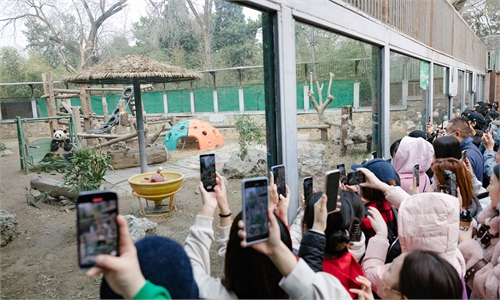ARTS / CULTURE & LEISURE
China to release world’s 1st hi-fi virtual giant panda

Photo: Courtesy of National Forestry and Grassland Administration
China will release the world's first high-fidelity virtual giant panda and a metaverse-like world in which it will live, China's forestry and grassland authority announced on Tuesday.The National Forestry and Grassland Administration will be working with Chinese tech giant Tencent to use the latest technology like AI and VR into construction of national parks, wildlife protection and public educations in the next three years.
According to Luo Lin from Tencent, using the company's powerful Start Engine and high-fidelity 3D biological restoration and real-time cloud rendering, the world's first high-fidelity digital giant panda will be able to live in a metaverse-like world, where it will interact with a hyper-realistic habitat and humans after being given AI life.
"The details of the giant panda's bones, muscles, skin, hair and facial features will be created with millimeter-level precision. After it goes online, the public can use their mobile phones to immerse themselves in the habitat and learn about the living habits and living environment of giant pandas," Luo said on Tuesday.
Long a cultural icon for China, the giant panda has been beloved by people in the country, as well as around the world, especially in countries that have giant pandas living in zoos, like the US, Japan and the Netherlands.
The digital project is a new and creative way to tell the stories of flagship species at China's national parks including giant pandas, golden snub-nosed monkeys, Asian elephants and Siberian tigers. It is hoped they will become super IP that can tell the world about China's efforts in bio-diversity.
Besides this, AI has been successfully used elsewhere. For instance, it has been used to automatically identify and analyze the tracks of snow leopards from 100,000 photos taken every three months in national parks, increasing the accuracy of identification to 98 percent and strengthening the efficiency of targeted protection measures.
The National Forestry and Grassland Administration has also introduced VR solutions, which make visiting China's Northeast Tiger and Leopard National Park on people's phones a reality.




